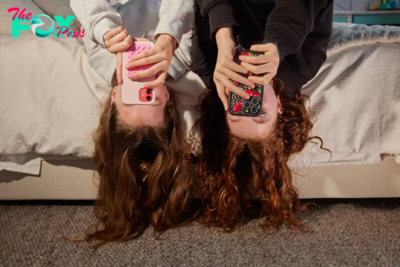Health
Eyes hurt after the eclipse? Signs of retinal damage, explained
Following the total solar eclipse raced across North America at a whopping 1,500 mph (2,400 km/h) Monday (April 8), drawing the eager eyes of tens of millions of skywatchers, internet searches for "my eyes hurt" seem to be spiking.
So how can you tell if you injured your eyes while watching the eclipse? And if you have, what should you do?
How can an eclipse hurt your eyes?
The only time it's safe to look at a solar eclipse with bare eyes is during totality, which is when the moon completely blocks the sun. It's dangerous to look at the sun without special eye protection any other time, including during partial phases of a solar eclipse, when the sun isn't fully obscured. This is due to a risk of "solar retinopathy," which refers to damage to the retina — the light-sensitive tissue at the back of the eye — caused by sun exposure or other bright lights.
Typically, protective reflexes, like blinking and pupil contraction, kick in if we glance at the sun on a normal day. During an eclipse, though, these reflexes may not be as robust because the sun is partly covered. This can make it easier to stare at the sun without discomfort — long enough to cause retinal damage.
You wouldn't necessarily feel this damage happening in real time because "the retina has no sensory nerve fibers," Dr. Vincent Giovinazzo, interim chairman of ophthalmology at Staten Island University Hospital in New York City, told Live Science after North America's 2017 eclipse.
That's why it's recommended that you view eclipses through an eclipse viewer, a solar filter fitted to a telescope or binoculars, or special eclipse glasses — although, unfortunately, there were counterfeit glasses floating around for this year's eclipse, Live Science's sister site Space.com reported.
In theory, looking at an eclipse could also burn the surface of the eye, causing a condition called solar keratitis, NBC reported. But this sort of burn would be much more common among people spending time at high altitudes or in bright, white snow without eye protection, as compared to eclipse watchers.
-

 Health15h ago
Health15h agoTeens Are Stuck on Their Screens. Here’s How to Protect Them
-

 Health21h ago
Health21h agoHow Pulmonary Rehab Can Help Improve Asthma Symptoms
-

 Health21h ago
Health21h ago10 Things to Say When Someone Asks Why You’re Still Single
-

 Health1d ago
Health1d agoThe Surprising Benefits of Talking Out Loud to Yourself
-

 Health2d ago
Health2d agoDoctor’s bills often come with sticker shock for patients − but health insurance could be reinvented to provide costs upfront
-

 Health2d ago
Health2d agoHow Colorado is trying to make the High Line Canal a place for everyone — not just the wealthy
-

 Health2d ago
Health2d agoWhat an HPV Diagnosis Really Means
-

 Health2d ago
Health2d agoThere’s an E. Coli Outbreak in Organic Carrots



























